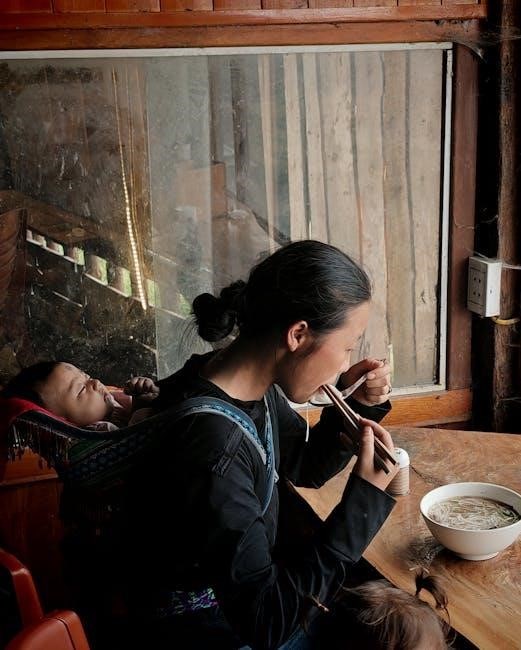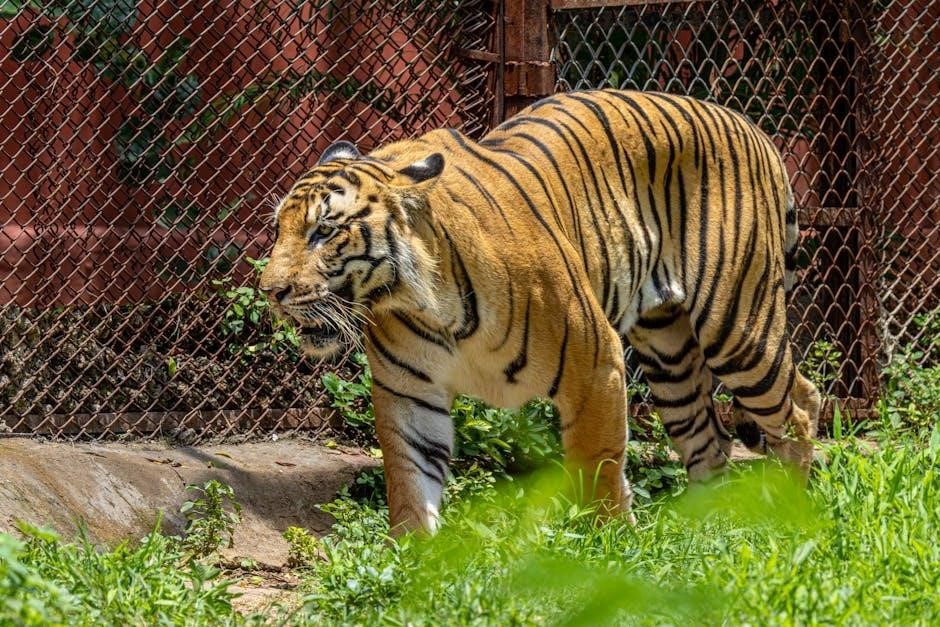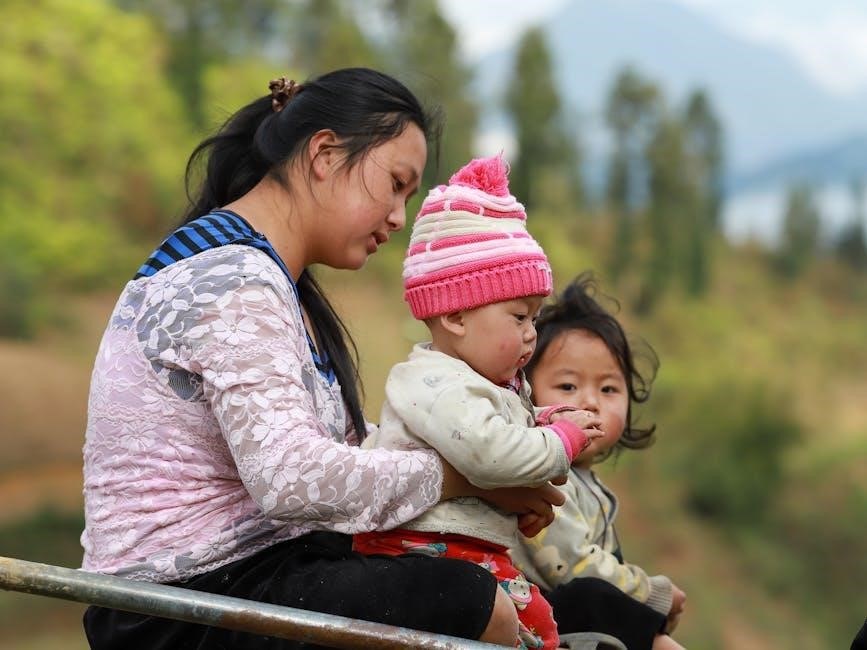Amy Chua’s memoir, Battle Hymn of the Tiger Mother, sparked global debate with its exploration of strict, culturally driven parenting. The book, released in 2011, details Chua’s demanding approach to raising her daughters, blending high expectations with intense discipline. Its controversial methods and cultural insights have made it a widely discussed and sought-after read, with many seeking the PDF version for convenience and accessibility.
Overview of the Book and Its Author
Amy Chua, a Yale Law professor, authored Battle Hymn of the Tiger Mother, a memoir that explores her strict, culturally influenced parenting style. Born to Chinese immigrants, Chua’s approach combines high expectations, intense discipline, and a focus on academic excellence. The book, published in 2011, details her daughters’ experiences under this regime, sparking global debate. Chua’s unique perspective as an American-born, Asian mother offers insights into cultural differences in parenting. The PDF version of her book remains widely sought after for its thought-provoking commentary on modern parenting practices.
The Concept of Tiger Parenting
Tiger parenting, popularized by Amy Chua, refers to a strict, demanding approach to raising children. Rooted in Asian cultural values, it emphasizes rigorous academic and extracurricular achievement. Parents set high expectations, pushing their children to excel through intense discipline and criticism. This method often prioritizes success over emotional well-being, fostering resilience and determination. The PDF version of Chua’s book delves into this concept, showcasing how traditional practices clash with Western parenting norms, sparking both admiration and controversy among readers worldwide.

Amy Chua’s Background and Inspiration
Amy Chua, a Yale Law professor, drew inspiration from her Chinese heritage and strict upbringing. Her marriage to a Jewish professor influenced her parenting style.
Early Life and Cultural Influences

Amy Chua was born to Chinese immigrant parents in Illinois. Her father, a retired engineer, and her mother, a homemaker, instilled in her the value of hard work and excellence. Chua grew up in a strict, traditional household where academic achievement was paramount. Her parents’ high expectations and disciplinary methods heavily influenced her own parenting style. Chua’s cultural heritage and upbringing shaped her belief in the importance of perseverance and accomplishment, which she later applied to raising her daughters.
Marriage, Family, and Personal Experiences
Amy Chua married Jed Rubenfeld, a fellow Yale Law professor, and they have two daughters, Sophia and Lulu. Chua’s parenting approach, as outlined in her book, was shaped by her desire to raise high-achieving children. Her strict methods, including intense academic pressure and extracurricular demands, sparked both admiration and criticism. Chua’s personal experiences as a mother influenced her philosophy, blending cultural values with modern parenting challenges. Her family life became a focal point in the debate over Tiger Parenting’s effectiveness and emotional impact on children.

Core Principles of Tiger Mother Parenting
Tiger Mother Parenting emphasizes strict discipline, high expectations, and criticism as motivation. It prioritizes academic and extracurricular excellence, pushing children to achieve their full potential relentlessly.
Strict Discipline and High Expectations
At the heart of Tiger Mother Parenting lies strict discipline and extraordinarily high expectations. Chua demands excellence, pushing her children to surpass mediocrity in academics, music, and life. No average grades or casual hobbies are tolerated. Through rigorous schedules, constant criticism, and micromanagement, she enforces a culture of achievement. This approach, rooted in her belief that children can overcome obstacles with relentless effort, often leads to resentment but also fosters resilience and success. Her methods starkly contrast with Western parenting, emphasizing sacrifice and hard work over self-expression.
The Role of Criticism in Child-Rearing
Criticism plays a central role in Tiger Mother parenting, as Chua believes in pushing children to their limits through harsh, direct feedback. She argues that shielding children from criticism fosters weakness, while blunt, often painful truths drive them to improve. This approach contrasts sharply with Western parenting, which emphasizes praise and self-esteem. Chua’s method, while controversial, aims to build resilience and a relentless work ethic. Love, in her view, is expressed through sacrifice and high demands, not empty compliments or coddling.

Academic and Extracurricular Excellence
Amy Chua’s Tiger Mother approach prioritizes academic and extracurricular excellence, demanding nothing less than perfection. Her daughters were pushed to excel in school, mastering subjects like math and science, and excelling in extracurriculars such as piano and violin. Chua believes that intense focus and rigor are essential for success in a competitive world. She rejects average performance, insisting that children should strive for the highest achievements. This relentless pursuit of excellence defines the Tiger Mother philosophy, aiming to prepare children for lifelong success through disciplined achievement.
Controversies Surrounding the Book
Amy Chua’s book sparked intense debate, with critics accusing her of promoting harmful, authoritarian parenting. Many argued her methods could lead to emotional damage and resentment, igniting a global discussion on parenting styles and cultural values.
Backlash and Criticism from Western Audiences
Amy Chua’s parenting methods faced fierce backlash in Western cultures, with many critics labeling her approach as overly harsh and potentially damaging. The book was perceived as promoting an extreme form of parenting that prioritized achievement over emotional well-being. Western audiences, accustomed to more nurturing and child-centered approaches, were particularly critical of Chua’s emphasis on strict discipline and public criticism. This backlash sparked a heated debate about cultural differences in parenting and whether such methods could be harmful to children’s self-esteem and mental health.
Cultural Differences in Parenting Styles
The debate sparked by The Battle Hymn of the Tiger Mother highlighted stark cultural differences in parenting. Eastern practices, like Chua’s, often emphasize collective family honor, academic rigor, and filial piety, while Western approaches prioritize individualism, creativity, and emotional well-being. Critics argued that Chua’s methods, rooted in her Chinese heritage, clashed with Western values that encourage self-expression and praise. The book underscored how cultural norms shape parenting styles, sparking a global conversation about the pros and cons of different approaches to raising children.
Impact on Chua’s Daughters and Family Life
The book highlights the impact of Chua’s parenting on her daughters, Sophia and Lulu. Sophia thrived under the strict regimen, while Lulu struggled with rebellion. Their experiences showcased the intense pressure and expectations Chua placed on them. The public’s mixed reactions—admiration for her dedication and criticism for her harshness—added to the family’s challenges; Despite the turmoil, the family’s resilience and bond were evident, reflecting both the strengths and drawbacks of tiger parenting. This dynamic shaped their lives and relationships, illustrating the complexities of such an approach.

Global Influence and Reception
The book sparked global debates on parenting, inspiring millions to reflect on their approaches. Its popularity led to translations in numerous languages, fostering cross-cultural discussions on parenting styles.

Worldwide Debate on Parenting Styles
The book ignited a global conversation about parenting methodologies, contrasting Eastern and Western approaches. It challenged traditional views, prompting debates in media, schools, and households worldwide. Parents from diverse cultures reflected on their own practices, questioning whether strict discipline or nurturing environments yield better outcomes. The intense discussions highlighted cultural differences in child-rearing, with some praising the Tiger Mother’s dedication while others criticized its rigidity. This debate became a symbol of broader cultural tensions and evolving views on parenting in a globalized world.
The book’s controversial ideas resonated widely, sparking both admiration and backlash, as parents sought to balance high expectations with emotional support.
Popularity and Translation of the Book
The book achieved remarkable global success, becoming an international bestseller. It has been translated into over 30 languages, reaching readers in Asia, Europe, and the Americas. The Tiger Mother’s controversial yet compelling narrative resonated with diverse audiences, sparking curiosity about Asian parenting practices. Its widespread popularity led to translations in Chinese, Korean, Japanese, and many other languages, further amplifying its impact. This broad accessibility ensured its ideas influenced parenting discussions worldwide.
The book’s translation success highlights its universal appeal, transcending cultural boundaries to become a global phenomenon.
Influence on Parenting Trends and Discussions

The book sparked intense global debates about parenting styles, challenging Western norms and inspiring reevaluations of traditional methods. It influenced discussions on balancing strictness with nurturing, encouraging parents to reflect on their approaches. The Tiger Mother phenomenon shifted cultural perspectives, prompting conversations about achievement, identity, and family dynamics. Its impact extends beyond academia, shaping modern parenting trends and fostering a deeper understanding of diverse child-rearing practices worldwide. The book remains a pivotal force in ongoing discussions about effective parenting.
Its influence continues to resonate in both personal and societal contexts.

Criticisms and Counterarguments
Critics argue that Chua’s extreme parenting methods can lead to emotional harm, stifling creativity and fostering resentment. Many see her approach as overly rigid and potentially damaging.
Accusations of Being Overbearing
Amy Chua has been criticized for her intensely demanding parenting style, with many accusing her of being overly controlling and domineering. Critics argue that her strict, unyielding approach fosters resentment and stifles a child’s autonomy. Chua’s refusal to accept anything less than perfection, as detailed in her book, has led some to label her methods as emotionally draining. While she believes in pushing children to succeed, others see her tactics as crossing into overbearing territory, potentially harming her daughters’ self-esteem and emotional well-being in the long run.
Psychological Effects on Children
Critics of Amy Chua’s tiger parenting approach highlight its potential negative psychological effects on children. The intense pressure to excel academically and musically, coupled with harsh criticism, may lead to anxiety, stress, and low self-esteem. Some argue that constant demands for perfection can foster a fear of failure and resentment. While Chua believes her methods build resilience, others worry they may harm emotional well-being. The long-term psychological impact remains a subject of debate, with some questioning whether the benefits outweigh the emotional toll.
Limitations of the Tiger Mother Approach
The tiger mother approach has several limitations, including its potential to stifle creativity and independence in children. Critics argue that the intense focus on achievement may limit exploration of personal interests and passions. Additionally, the strict, authoritarian style can create power imbalances, making children overly dependent on parental approval. The approach may also fail to account for individual differences in temperament and learning styles, potentially neglecting emotional and social development. These limitations highlight the need for a more balanced parenting strategy.
Support and Positive Reception
Despite criticism, The Battle Hymn of the Tiger Mother received significant support for challenging parenting norms. Many appreciated its emphasis on high expectations and achievement, resonating with parents valuing rigorous education and cultural heritage. The book sparked debates, highlighting its impact on modern parenting discussions.
Testimonials from Supporters
Many parents and educators have praised Amy Chua’s approach, sharing stories of how her methods inspired them to push their children toward excellence. Supporters highlight the book’s honesty and practical advice, noting how it challenged them to rethink parenting strategies. The PDF version has made these insights more accessible, allowing readers to highlight and share key passages. Testimonials often emphasize the cultural resonance and the confidence it instilled in parents to embrace high expectations. The book’s ability to spark reflection has made it a valuable resource for many families globally.
Impact on Modern Parenting Trends
Amy Chua’s book has significantly influenced modern parenting, sparking global conversations about discipline, expectations, and cultural values. Many parents have adopted elements of tiger parenting, blending strictness with love. The PDF version’s accessibility has further amplified its reach, inspiring debates on balancing high standards with emotional well-being. While some critics argue it promotes overbearing behavior, supporters credit it with fostering resilience and excellence in children. The book has undeniably reshaped how many view parenting, encouraging a more intentional approach to raising achievers in a competitive world.
Readers worldwide seek the PDF version for its convenience and accessibility, allowing them to engage with Amy Chua’s provocative ideas on parenting anytime, anywhere digitally.
Why Readers Seek the PDF Version
Readers seek the PDF version of The Battle Hymn of the Tiger Mother for its convenience and accessibility. The digital format allows for easy reading across devices, making it portable and shareable. Many appreciate the ability to highlight and annotate text, enhancing their engagement with Amy Chua’s controversial ideas. Additionally, the PDF version is often preferred for its space-saving benefits and instant access, catering to modern readers who value flexibility and efficiency in their reading experiences.
Availability and Sources for Download
The PDF version of The Battle Hymn of the Tiger Mother is widely available through various online platforms. Major eBook retailers like Amazon, Barnes & Noble, and Google Play Books offer the PDF for purchase. Additionally, it can be found on popular eBook platforms such as Kobo and Apple Books. Some websites may also provide free downloads, though users should be cautious of unauthorized sources to avoid legal issues and ensure quality. Purchasing from reputable sites is recommended for a secure and high-quality reading experience.
Importance of the Digital Format
The digital format of The Battle Hymn of the Tiger Mother offers unparalleled convenience and accessibility. Readers can access the book on multiple devices, making it ideal for on-the-go reading. The PDF version preserves the original formatting, ensuring a seamless reading experience. Additionally, digital copies are often more affordable and environmentally friendly. The ability to highlight, search, and annotate text makes it a valuable resource for students, researchers, and parents seeking insights into tiger parenting. Its widespread availability has made it a preferred choice for many readers globally.
The Battle Hymn of the Tiger Mother sparked intense debate on parenting styles, challenging cultural norms and inspiring reflection on child-rearing practices globally.

Legacy of the Book
The Battle Hymn of the Tiger Mother has left a lasting impact on global parenting discussions, challenging traditional approaches and inspiring new perspectives. Its controversial yet thought-provoking narrative sparked widespread debate, making it a cultural phenomenon. The book’s exploration of tiger parenting has influenced countless parents, educators, and policymakers, fostering a deeper understanding of cultural differences in child-rearing. As a result, it remains a significant reference in modern discussions about parenting styles and their effects on children’s development and success.
Final Thoughts on Tiger Parenting
The Battle Hymn of the Tiger Mother ignites intense debate about parenting styles, challenging readers to reflect on their own approaches. While critics argue that tiger parenting can stifle creativity and emotional well-being, supporters emphasize its effectiveness in fostering resilience and achievement. Amy Chua’s philosophy, though polarizing, encourages parents to rethink their priorities and expectations. Ultimately, the book serves as a catalyst for discussions on cultural values, parental sacrifice, and the delicate balance between discipline and nurture in raising successful, fulfilled children.
